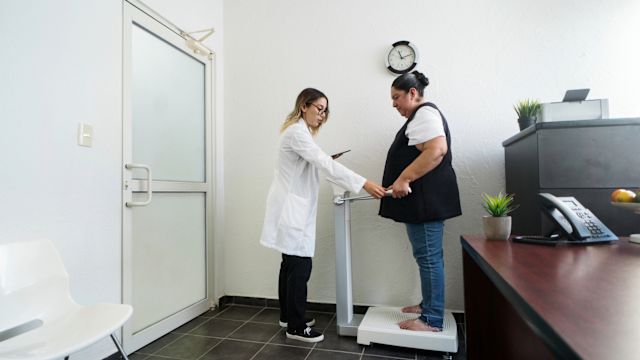Updated on December 17, 2024
As with many chronic health conditions, the first steps in treating obesity involve gathering information. Here is a look at the information you’ll need to share with your healthcare providers, as well as the tests and exams to expect at a weight-loss consultation.
Sharing information with your healthcare provider
It always helps to go to a healthcare appointment prepared. When discussing obesity and obesity treatment, your healthcare providers will have questions for you, and you will have topics that you will want to bring up with your healthcare provider.
Here are some things that you should be prepared to talk about:
- Your weight history.
- Weight-loss methods you have tried in the past.
- Your eating habits, including the foods you eat in a typical day and factors that influence the foods that you eat.
- Your lifestyle habits, including alcohol consumption, tobacco use, and recreational drug use.
- Your exercise habits and the number of minutes you are active each day.
- Any health conditions you have, including conditions you have been diagnosed with in the past and any conditions you are currently treating.
- Any health concerns you have. A health concern may be a symptom that you’ve noticed that hasn’t been evaluated by a healthcare provider, or some aspect of your health that you worry about.
- Your moods, stress level, and mental health. Weight can influence mental health, and mental health can influence weight. In many cases, this is an important factor to consider and address during weight-loss treatment.
- If you are pregnant or planning on becoming pregnant. Weight-loss medications are not safe to take during pregnancy.
- Your sleep habits. Obesity can cause obstructive sleep apnea, a condition that causes a person to stop breathing during sleep.
- A list of all medications you take, including prescription medications, over-the-counter medications, and supplements (including herbal supplements). Share a copy of this list with your healthcare provider.
Obesity is a very common health condition, but it is also a health condition that affects everyone a little bit differently. Take some time to think about what you want to discuss with your healthcare provider. For example, the reasons why you want to reduce weight, how obesity impacts your quality of life, your weight-loss goals, and what approaches to treatment you think can help you achieve these goals.
What to expect at your appointment
In addition to discussing the topics above, a consultation to discuss obesity treatment will include a physical exam. Here are some exams a healthcare provider may perform during your appointment:
- Measuring your heart rate, blood pressure, and temperature.
- Listening to your heart and lungs with a stethoscope.
- Measuring height and weight, and using this information to calculate body mass index (BMI). BMI is a commonly used calculation to diagnose obesity.
- Waist circumference may also be measured. Waist circumference above a certain number is associated with additional health risks and is also important to diagnosis.
- Evaluating any known health problems or current health concerns.
- Taking blood samples for laboratory testing or writing a prescription for blood work at a lab. Blood tests may check blood glucose, cholesterol, thyroid problems, liver function, kidney function, and other biomarkers.
It helps to arrive to an appointment with a goal, such as getting a medical diagnosis or discussing weight-loss treatment. Sometimes, just taking that first step to speak to a healthcare provider is the goal.
It also helps to leave an appointment with a clear idea of your next steps. This can be things like making an appointment with a provider you have been referred to, getting blood work done at a lab, or contacting your insurance company to inquire about what treatments are and are not covered. If you are uncertain about the next steps, ask your healthcare provider.



